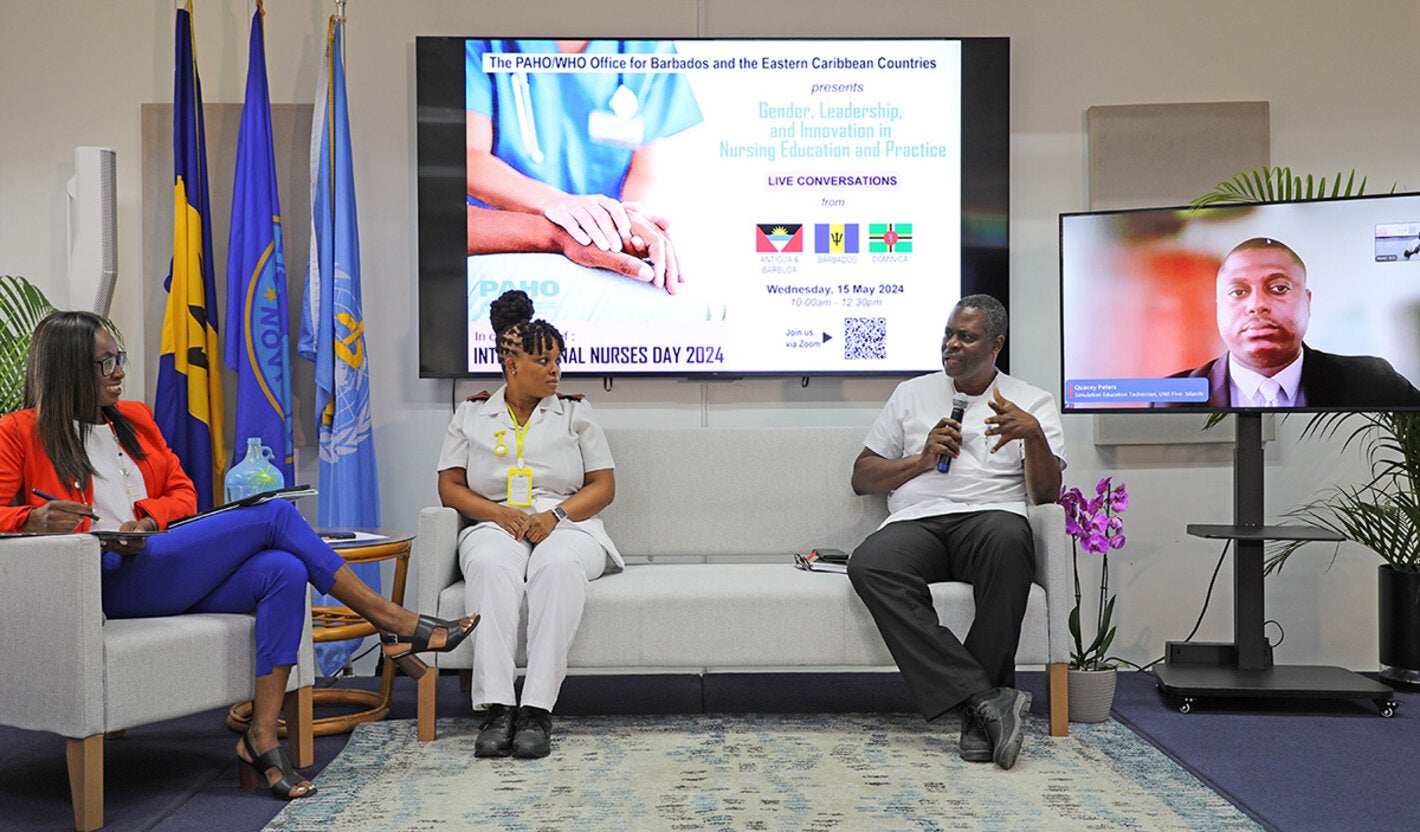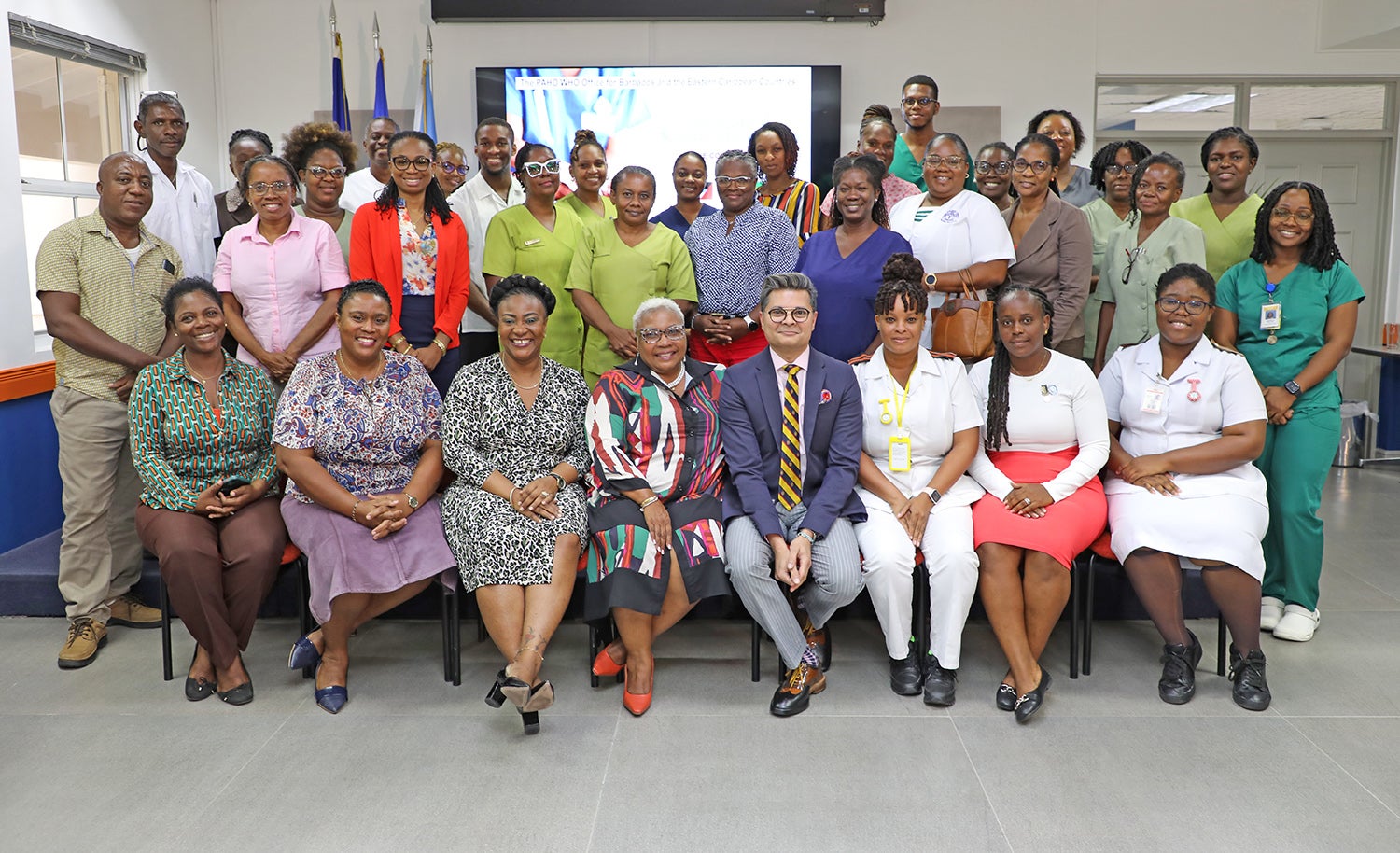
Bridgetown, Barbados, 15 May 2024 (PAHO) - The Pan American Health Organization (PAHO) supported the nursing profession and embraced International Nurses Day by hosting a forum, which engaged nurses across primary and secondary levels of care in discussions to strengthen the nurse workforce towards achieving universal access and universal health coverage.
Under the theme ‘Gender, Leadership and Innovation in Nursing Education and Practice’, panelists from across the eastern Caribbean engaged in three 40-minute moderated sessions on: Gender and Nursing - the past, present and future; Leadership in Nursing and Nurses as Leaders; and Embracing Innovation in Nursing. Thirty-five nurses across all levels of care joined the discussions in-person, along with 60 online guests.
In welcoming participants, Advisor Health Services and Access, Dr. Vishwanath Partapsingh, and Acting Chief Nursing Officer with the Ministry of Health and Wellness, Mrs. Annastacia Jordan, described the forum as an opportunity for nurses to share their opinions and experiences to optimize nurses and midwives’ contribution to achieving Universal access to health and universal health coverage.
Gender and Nursing - the past, present and future
Dr. Taraleen Malcolm, PAHO’s Advisor NCDs and Mental Health, led the discussion on ‘Gender and Nursing - the past, present and future’, and was joined by panelists Public Health Nurse Mutual Archer, Barbados Community College (BCC) nursing student Ms. Channele Walker, and Mr. Quacey Peters, Simulation Education Technician, UWI Five-Islands Campus.
The panel emphasized the need for increased gender diversity in nursing, noting that while nursing is traditionally female dominated, there is a growing presence of male nurses. Participants discussed the need to address stereotypes associated with nursing and underscored the importance of implementing policies that provide equal opportunities for professional development and leadership roles.
Cultural perceptions and societal expectations regarding gender roles in the Caribbean were examined. The panel acknowledged that deeply ingrained cultural norms can influence career choices and perceptions of nursing as a profession. The impact of gender on patient care was another critical point of discussion. Panelists explored how gender diversity among nurses can enhance patient care by providing diverse perspectives and approaches to healthcare. The importance of cultural competence and gender sensitivity in patient interactions was emphasized.
Leadership in Nursing and Nurses as Leaders
Acting Chief Nursing Officer Mrs. Annastacia Jordan led the discussion on the topic ‘Leadership in Nursing and Nurses as Leaders’ and panelists were BCC nursing student Ms. Ashley Greene; Dr. Wendy Sealy and Dr. Partapsingh.
The panelists underscored the expanding roles of nurses beyond traditional bedside care to include leadership positions in healthcare administration, policymaking, and education. They discussed how nurses can leverage their unique skills and experiences to influence healthcare systems and policies effectively. The importance of continuous education and professional development for nurses aspiring to leadership roles was emphasized. Panelists advocated for increased access to advanced nursing education programs, leadership training workshops, and mentorship opportunities to prepare nurses for leadership positions.
Embracing Innovation in Nursing
Dr. Wendy Sealy moderated the final topic and was joined by panelists Dr. Andrea F. Brathwaite, Strategic Project Director, Office of the Principal, BCC; Mr. Quacey Peters; and Mrs. Julie Frampton, Lecturer in Nursing, Dominica State College.
The panelists stressed the importance of integrating innovative approaches in nursing education to enhance learning outcomes and prepare nurses for the evolving healthcare landscape. The discussion highlighted the need for curricula that incorporate cutting-edge technology and teaching methodologies. A major focus of the discussion was on simulation-based training. Panelists discussed how simulation technology, including virtual reality (VR) and high-fidelity mannequins, provides realistic and immersive learning experiences for nursing students. This approach allows students to practice clinical skills and decision-making in a controlled, safe environment.




